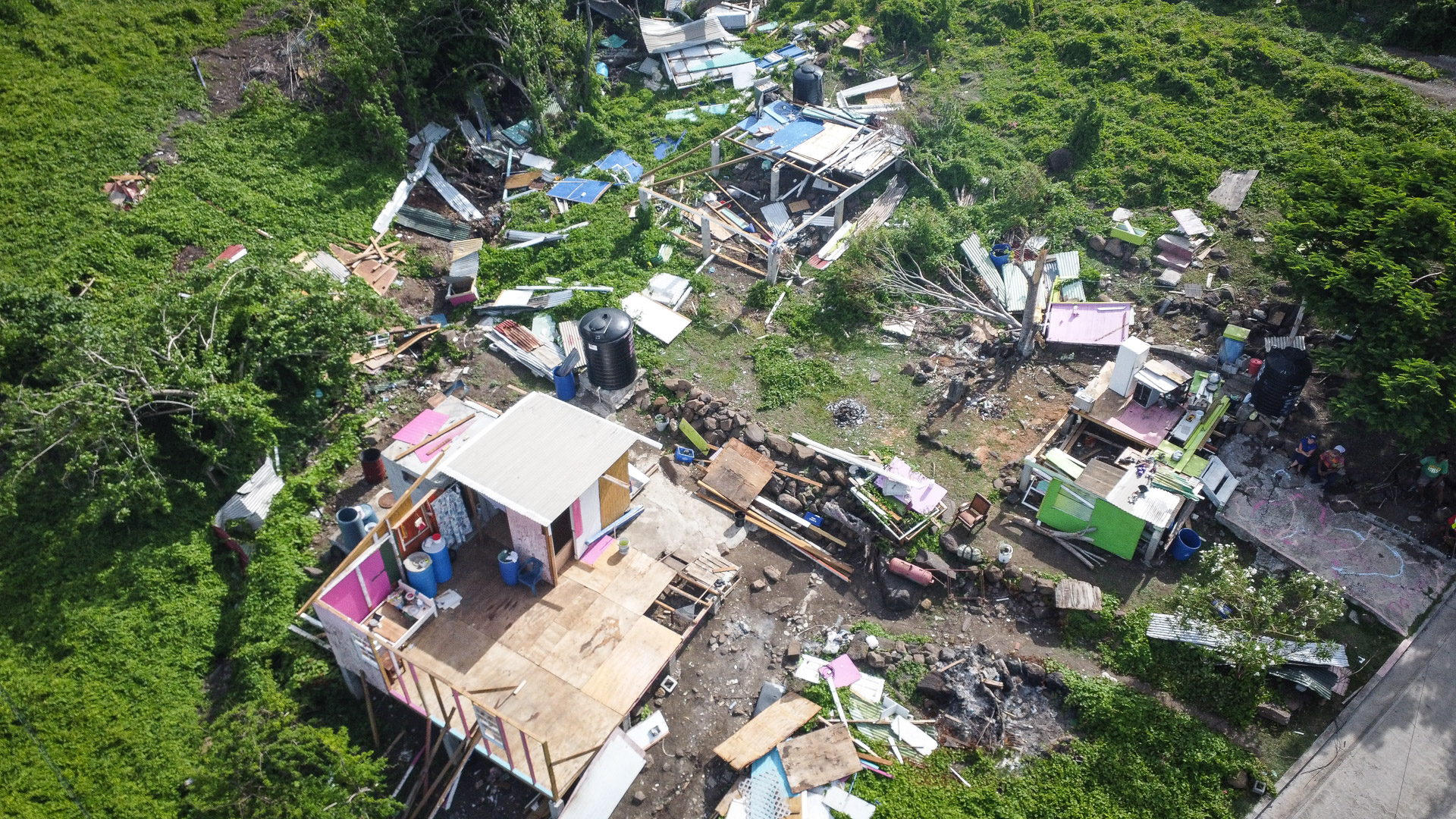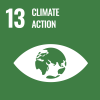Carriacou, Grenada – Volunteers from near and far have converged on Carriacou, a small paradise island in Grenada, to provide assistance and a glimmer of hope to the residents devastated by Hurricane Beryl, which hit on 1 July 2024. This Category 4 hurricane, the most powerful ever recorded in the Atlantic in June, has left the island in ruins, damaging more than 95 per cent of buildings and leaving behind flattened homes, destroyed infrastructure, and a community in desperate need of help.
Among the volunteers is Ryan Jackson, a 50-year-old from London with Grenadian heritage. He came to the island with his wife to support his Grenadian parents, who survived the hurricane. “I simply want to help my parents and others. I feel I have a duty to help those who have lost everything,” Jackson remarked, as he worked tirelessly to assist elderly residents clean up the debris from their houses.

Rose Sylvester and her daughter Andrea stand resilient in front of her destroyed house. Photo: IOM/Gema Cortes

Volunteers remove Rose Sylvester’s bed from her destroyed home after hurricane Beryl. Photo: IOM/Gema Cortes

A volunteer hammers a board while helping to clean up Rose’s house. Photo: IOM/Gema Cortes

An aerial view of volunteers diligently cleaning up the remnants of Rose’s home. Photo: IOM/Gema Cortes
A long-standing tradition
The scene in Carriacou is one of complete desolation. Collapsed houses, wrecked police stations, schools, hospitals, and debris-strewn streets all portray a grim picture. The island remains in a state of emergency, with efforts to restore power to remote areas expected to take weeks. The hurricane’s impact was so severe that entire villages were wiped out, leaving many communities still living in shelters or with relatives. Out of the total 857 residential buildings detected in Copernicus satellite imagery, all were somehow damaged. Almost one third (32 per cent) are fully destroyed, one quarter are damaged and the remaining 43 per cent are possibly damaged.
Volunteering has long been a tradition in the Caribbean, a region frequently battered by natural disasters. Volunteers from Trinidad and Tobago, headed by Keon Bowen, have been working tirelessly for the past three weeks.
“People are so devastated that they haven’t come back to the island. We are working in small squads throughout the areas,” Bowen explained under a scorching sun while clearing debris from the wrecked home of Rose Sylvester, a 66-year-old resident who is currently living in a shelter with her two daughters and granddaughter. “I only want to go back to my own house. This is terribly sad, I have nowhere else to go,” she remarked, her voice breaking with emotion as she sees her destroyed television and kitchen, along with the debris cleared. She hopes she will soon get support to rebuild her house.

Ryan Jackson travelled from London to Carriacou to support his Grenadian parents in a time of need. Photo: IOM/Gema Cortes

Volunteers line up to board a boat to Carriacou, ready to assist with the debris cleanup efforts. Photo: IOM/Gema Cortes

IOM staff engage with volunteers and affected residents in front of homes devastated by the disaster. Photo: IOM/Gema Cortes

Pieces of debris and destroyed houses line the side of the road as a reminder of the disaster’s impact. Photo: IOM/Gema Cortes
Community resilience amid challenges
Despite the immense challenges that Carriacou faces, the International Organization for Migration (IOM) has been active in distributing humanitarian assistance in coordination with the Government of Grenada, including tarpaulins, solar lamps, and tents to people whose homes and livelihoods have vanished overnight. The scale of the disaster has overwhelmed local resources. “After first providing thousands of non-food items, we continue bringing critical assistance to people recovering from the devastation. We will continue the distribution of solar lamps and tarpaulins, repair key infrastructures, and teach and assist the local population how to build better roofing to withstand future disasters,” said Martina Cilkova, IOM Shelter and Settlement Officer.
Every day, volunteers assist hundreds of people, reflecting the resilience and determination of the Grenadian people. Anthony St. Hilaire, a 66-year-old resident, embodies the spirit of endurance that characterizes the community. Living in the remnants of the toilet of his lifelong home covered by a plastic sheet, he plays his ukulele, the only item he could recover, and states, “We have life; the rest is material.” His words resonate with many who have lost so much but remain committed to rebuilding their lives and communities. “Grenadians endure together and move together.”
Youth volunteers and families are assisting in various ways, from removing debris to providing and packing food. “I didn’t want to sit and do nothing,” said Angele while distributing cooked food. The experience has also fostered a sense of closeness. “I’m proud to be a volunteer as I can see the impact of our work in people’s smiles.”

The remnants of Anthony St. Hilaire’s lifelong home, where he has been sleeping under a plastic sheet since Hurricane Beryl struck. Photo: IOM/Gema Cortes

Anthony St. Hilaire, 66, plays his ukulele, the only item he could salvage from his lifelong home after it was wiped out. Photo: IOM/Gema Cortes

An aerial view of the remnants of Anthony’s lifelong home. Photo: IOM/Gema Cortes

An aerial view of destroyed houses with the Caribbean Sea in the background, highlighting the extent of the devastation. Photo: IOM/Gema Cortes
A long road to recovery
The recovery process is expected to be lengthy with many challenges. The Government, Caribbean Disaster Emergency Management Agency (CDEMA), UN agencies, local and international organizations are collaborating to provide essential services, and support rebuilding efforts. However, they face significant challenges in logistics, resource allocation, and rebuilding to withstand future hurricanes, especially with the peak of hurricane season approaching.
The devastation in Grenada is unprecedented. One month later, while debris has been cleared from the streets, many houses remain roofless or reduced to rubble. Daily life has regained some normalcy, but there is still no electricity. Entire villages were wiped out by storm surge caused by the hurricane, and many communities still live in shelters or with family members.
Yet, amid the chaos, the spirit of volunteerism and community resilience is a ray of hope. Volunteers continue to work diligently, driven by a shared sense of solidarity. As the tourist paradise island slowly rebuilds, the efforts of these volunteers will be remembered as an example of the Caribbean people’s enduring resilience and unity.

A sofa sits in a roofless house, ruined by Hurricane Beryl. Photo: IOM/Gema Cortes

IOM staff evaluate the extent of damage to households devastated by the disaster. Photo: IOM/Gema Cortes

Rose Sylvester, 66, finds temporary refuge in a shelter with her two daughters and granddaughter after being displaced. Photo: IOM/Gema Cortes

An aerial view of collapsed boats. Photo: IOM/Gema Cortes
This story was written by Gema Cortes, IOM Media and Communications Unit, Office of the Special Envoy for the Regional Response to the Venezuela Situation.


